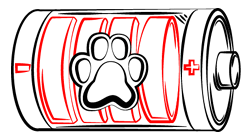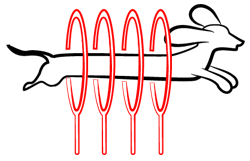
Paws ‘N’ Pups Quickview
Size
| Energy Level
| Trainability
| Paws ‘N’ Pups Rank
|
Characteristics
| Physical Characteristics: Height: 21-29” Weight: 70-80 lbs. Energy Level: High | Colors: The Shollie is found in the following colors:
|
Health & Longevity
Average Life Span: 13-15 years
The Shollie is a mixed cross breed between the Border Collie and the German Shepherd. Like all hybrid breeds, the Shollie is less susceptible to hereditary health problems than his purebred counterparts. However, he may still experience health issues that are common to either parent breed.
Joint issues such as hip and elbow dysplasia may affect some Shollies. Hip dysplasia occurs when a malformed hip joint does not allow the thighbone to fit properly into place, often leading to discomfort, pain, and limping. In more severe cases, arthritis or even lameness may occur, sometimes necessitating surgery. Dogs with hip dysplasia should not be bred, so ensure that your prospective puppy’s parents have no history of the condition. Although it is hereditary, hip dysplasia can be triggered by rapid weight gain or injury. Similarly, elbow dysplasia stems from a malformed elbow joint that may also lead to discomfort, pain, arthritis, or even lameness. Corrective surgery is an option with elbow dysplasia as well.
Exocrine Pancreatic Insufficiency (EPI) occurs when the pancreas fails to produce sufficient amounts of digestive enzymes, and this may take place in the Shollie. Symptoms can include weight loss, even if it is accompanied by increased appetite and chronic diarrhea. In some cases, the affected dog may consume his own stool. The most common treatment for EPI is supplementing your dog’s diet with a pancreatic enzyme supplement, which comes in a powdered form that can be added to your dog’s food.
Some Shollie Dogs may suffer from bloat, a condition in which the stomach becomes overly full of gas, fluid, or food, expanding dangerously and putting excess pressure on surrounding organs. In some cases, gastric torsion may occur, when the stomach twists, trapping blood and preventing it from flowing to the heart and other vital organs. Bloat can be fatal within a few hours if left untreated, so get your Shollie to a veterinarian right away if you observe symptoms such as pale gums, excessive drooling, failed attempts to vomit, or a swollen stomach. Treatment will likely involve the veterinarian removing excess air from the stomach with a stomach tube or a hollow needle. If your dog’s stomach has twisted, the veterinarian will have to return it to its proper location.
Other problems for the Shollie may include epilepsy, allergies, and eye issues.
The average life expectancy for a Shollie is 13-15 years.
Temperament & Train-ability
Like all hybrid breeds, the temperament of the Shollie can vary, because he can exhibit any combination of characteristics known to his parent breeds. However, the typical Shollie is intelligent, energetic, and extremely hard-working, as he descends from two working breeds.
The Shollie should not live in an apartment because he needs plenty of space, and a yard to run freely in is necessary to burn off his high energy. The yard needs to be securely fenced to prevent the Shollie from running off in pursuit of small animals. An active owner is perfect for the Shollie, who needs playtime, opportunities to run off leash, and long walks or jogs each day. Mental stimulation in the form of training or puzzle toys is also a necessity for this intelligent breed. Without adequate physical and mental stimulation, the Shollie may become bored, destructive, and poorly behaved.
The affectionate, loving Shollie bonds closely with his family and loves being the center of attention. He enjoys being involved in all family activities, and he does not do well if left alone for long periods of time. He gets along well with children, although he may try to herd them and can be a bit rough for very young children. Although the Shollie can be friendly with other dogs, he is likely to pursue smaller pets. He is a good watchdog who will warn his family of approaching danger. He rarely barks unless he feels it is necessary.
Training the Shollie can be relatively easy, although some do have a bit of a stubborn streak. He is likely to be intelligent and enjoy learning new skills, so keep sessions challenging and varied to continue stimulating his mind. Clearly establish yourself as the leader by consistently enforcing your rules and expectations. However, do not use harsh training tactics, because the Shollie’s stubbornness will only increase if he feels he is being treated unfairly. Use positive reinforcement such as favorite treats, extra playtime, and encouraging praise when earned in order to motivate your Shollie.
Grooming
The Shollie is a moderate shedder who experiences heavier seasonal sheds. Weekly brushing is generally sufficient to keep the Shollie’s coat looking its best, but daily brushing may be required during periods of heavier shed. Bathe the Shollie only as needed. Frequent bathing can be harmful as it will dry out their skin.
Trim his nails when they grow long enough to be heard tapping on the floor to prevent overgrowth and cracking. Check his ears weekly for signs of infection such as redness, tenderness, and odor. Brush his teeth at least 2-3 times weekly to maintain good overall health and prevent bad breath.
Diet
The average Shollie should consume 3-4 cups of high-quality dry dog food daily, preferably divided into at least two smaller meals.
Take precautions against bloat by ensuring that your Shollie does not eat too rapidly. Do not allow him to drink excessive amounts of water directly before or after eating, and impose a one hour waiting period between eating and physical activity. Do not feed him from a raised bowl unless your veterinarian specifies otherwise.
Ensure that your Shollie has access to clean, fresh drinking water at all times.
Looking for a Shollie?
 Find A Shollie Breeder |  Shollie Puppies For Sale |  Adopt A Shollie |
Cost
On average, a Shollie puppy will cost $475-$950. Prices will vary according to puppy gender and parentage, as well as breeder location and reputation.
If you are able to adopt a Shollie, you should expect adoption fees to cost up to $175, depending on your location.
Paws ‘N’ Pups Ranking
Paws ‘N’ Pups ranks every breed out of 4 with 1 being easiest to integrate into your life and 4 being the toughest – The lower the ranking the better.
Ranking takes into account a few basic factors including cost, skill level needed, high vs low maintenance and how critical regular training is to success. The Shollie ranks a 2. He cannot live in an apartment and needs plenty of physical and mental stimulation, as well as proper socialization to ensure appropriate behavior. He does have a fairly low maintenance coat, except during periods of heavy shed, and he is not overly difficult to train due to his intelligence and love of learning.
Breeds Similar To Shollie
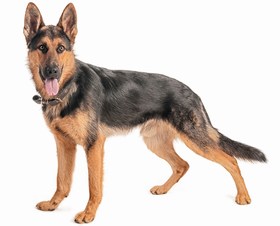 German Shepherd | 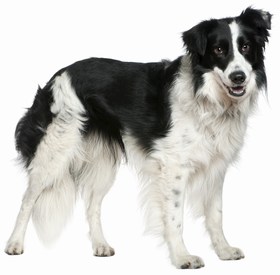 Border Collie | 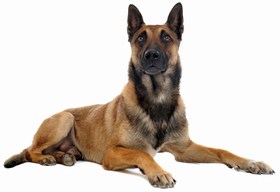 Belgian Malinois | 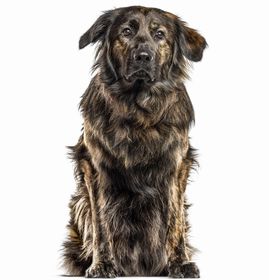 Golden Shepherd |


